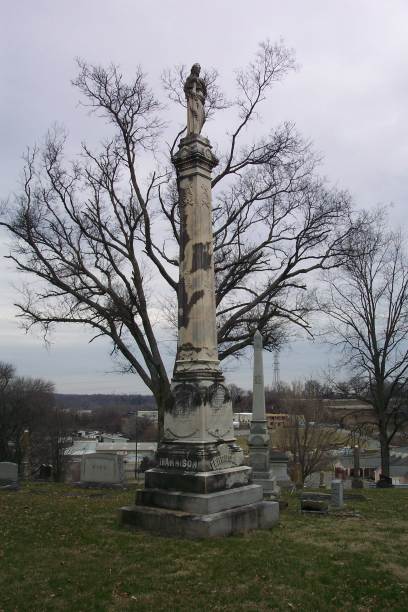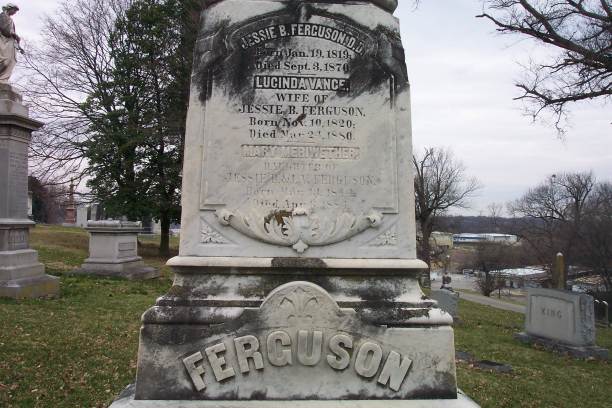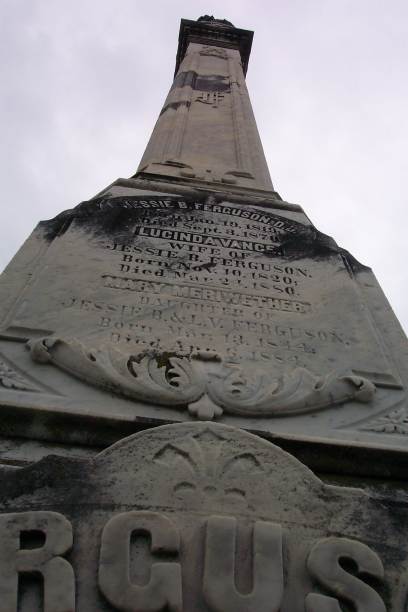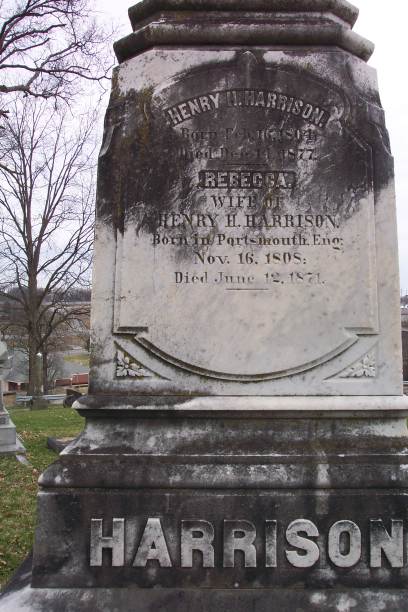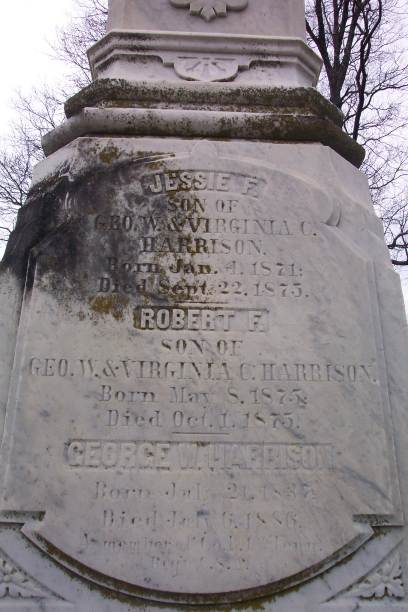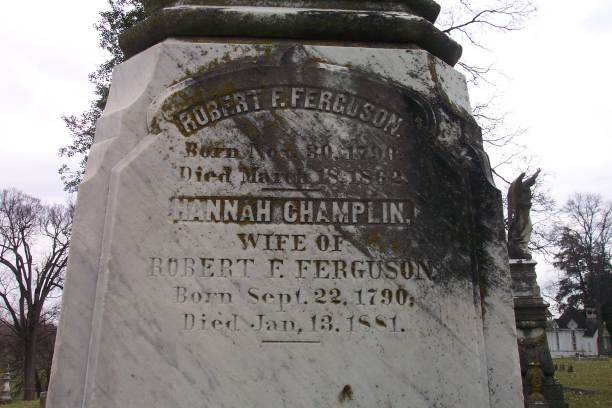Jesse Babcock Ferguson
1819-1870
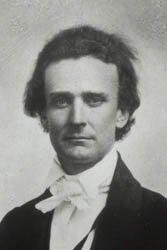
Courtesy of
C. Wayne Kilpatrick
12.2012
![]()
Biographical Sketch On The Life Of Jesse B. Ferguson
Like a meteor which flashes across the horizon, making a trail of glorious light behind it, and then suddenly disappearing and leaving nothing but darkness in its wake, so Jesse B. Ferguson came above the horizon and shone as a great pulpit orator in the church of Christ at Nashville, Tenn., and then as suddenly disappeared and dropped into obscurity. Perhaps no preacher of the gospel ever stood so high in the estimation of the people and received the plaudits of the populace and then dropped so low as did this man.
Jesse Babcock Ferguson was born in the city of Philadelphia, Pa., January 19, 1819. His father, Robert French Ferguson, was of Scotch descent, and his mother, Hannah Champlain Babcock, was of English descent. His grandmother on his father's side was of the Quaker family of French, who were among the early settlers of New Jersey. His mother was related to the Babcocks and Champlains of Rhode Island and was mingled with Puritan and Quaker blood. Soon after Jesse B.'s birth the family moved to the Shenandoah Valley, in Virginia. His father resided near Winchester. At the age of eleven Jesse B. was placed in Fair View Academy, and made rapid progress in his studies. At the age of fourteen young Ferguson met with a severe disappointment. His elder brothers had been educated at William and Mary College, one of the oldest educational institutions in Virginia, and Jesse B. had expected to take his turn as a student there. His father had some financial reverses and could not give him the advantages that his brothers had. Young Ferguson was so sorely disappointed that he resolved to turn his attention to something that would furnish him with money to continue his education.
He decided to apprentice himself in the printing office of a newspaper published in Winchester. A little more than a year after young Ferguson had entered the office as an apprentice his employer failed in business and was obliged to cease publishing the paper. He released young Ferguson from his obligations as an apprentice and advised him to obtain a classical education. His father would not let him give up his apprenticeship and soon found work for him in a book printing establishment in Baltimore, Md. He remained here but a few weeks, when his health gave way and he had to return home. He had what was then called "white swelling," as a result of which, after suffering for three months, he was left a cripple for life. About this time an elder brother, R. F. Ferguson, became editor of a paper published in Virginia. Jesse B. soon joined his brother and continued his studies with his work. He completed the courses in Latin and Greek. At the age of twenty-one he left Virginia and went to Ohio. He opened a school in Logan County, and taught for a while there. He married the daughter of James Mark, who had gone from Kentucky to that State. He did not remain very long in Ohio, but came to Southern Kentucky, where his wife's kinspeople lived. He became a Christian, and soon began to take public part in the worship.
Jesse B. Ferguson became a preacher of the gospel in 1838. He preached for four years in Kentucky and established many congregations in the rural sections of that State. He was applauded there as a very brilliant and eloquent preacher. He soon became known over the State of Kentucky and was acclaimed as one of the best preachers in the entire State. He was brilliant, and he knew it. He was possessed with a very high degree of self-esteem, and fed his vanity until he developed into a very sophisticated preacher. Some claim that he was spoiled by the compliments that he received and the praises which were given him. Few men have possessed such conceit as he had. Of course, as he developed so much egotism, he lost in spirituality.
In 1842 the church at Nashville, Tenn., which numbered about five hundred members, was growing rapidly. Alexander Campbell had frequently visited the church and had greatly strengthened it. Dr. Wharton was serving as elder and also preacher of the church at that time. Philip S. Fall had labored with the church until he had built up a very strong congregation. In May, 1842, Jesse B. Ferguson was invited to hold a series of meetings. He had become quite prominent in Kentucky at that time. He came and preached for two weeks. He captivated his audiences, and his fame soon spread throughout the city and surrounding country. His audiences increased in number until the church house was filled to overflowing. He had many additions to the church during this meeting. At the close of the meeting he was invited to come and work with the church in Nashville. He was greatly flattered by the invitation, but did not accept it. Again, in 1844, by invitation, he visited the church and held another meeting, which was even a greater success than his former meeting. From the time that he closed the meeting in 1844 until February 24, 1846, he was constantly implored by letters to come and take up work with the church in Nashville.
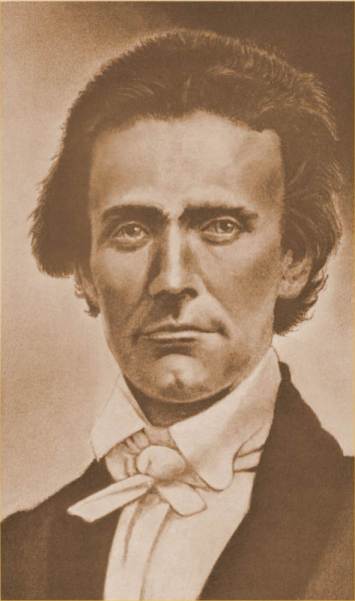
Artwork by Robert Fero, Source: Stone-Campbell Movement:
An Anecdotal History Of Three Churches
by Leroy Garrett, Page 388b, Enhanced For This Site
He left his family in Southern Kentucky and came to Nashville in February, 1846, and remained with the church one year. At the close of the year he was waited upon by a committee of the church with a unanimous request that he accept the work for another year. He took a month's vacation and brought his family, in March, 1847, to live in Nashville and work with the church. For five years he preached for the church and enjoyed almost unexampled success. The church continued to increase in number and popularity in the city until it was necessary to erect a larger house. The church of Christ in Nashville, with Jesse B. Ferguson as its preacher, enjoyed a greater prominence and popularity than any of the denominational churches. During this time Brother Ferguson was looked upon as the greatest pulpit orator that ever visited Nashville, and he enjoyed the fame of being the greatest and most eloquent pulpit orator in the South. He was popular with all the churches of Christ in Tennessee and the South. He is described as a man of fine personal appearance, a very fluent writer, and a very fascinating and eloquent speaker.
In January, 1844, Tolbert Fanning began to publish the Christian Review, and continued the publication of this journal for four years. He was pressed with other duties, and he turned the publication of the Christian Review over to Jesse B. Ferguson. Brother Ferguson changed the name of the publication and became the editor of the Christian Magazine. The first issue of this paper was published in Nashville, January, 1848. Brother Ferguson had associated with Tolbert Fanning and B. F. Hall. The names of these brethren appeared as associate editors for only two issues. Brother Ferguson continued the publication of the Christian Magazine for six years. During the era of his popularity he was made a member of the Board of Trustees of Franklin College. His name appears on the list of the members of the board of Franklin College for 1848. No man had more honors thrust upon him by the brotherhood in Nashville and in Tennessee than did Brother Ferguson. He was the preacher for the largest congregation in the State; the most popular preacher in Nashville; a member of the board of trustees for Franklin College, which was presided over by Tolbert Fanning, who was a prince among educators in the brotherhood at that time; and the editor in chief of the Christian Magazine. Brother Ferguson had the qualities of a successful politician. He flattered all and was flattered by all. For several months he enjoyed the honor and distinction of being the youngest preacher in the city and the most famous one.
In April, 1852, in giving an exposition of 1 Pet. 3:19, he expressed the sentiment that all "whose place of birth and external circumstances prevented the hearing of the gospel in life would not be condemned without hearing it." This was published in the Christian Magazine, in the April issue. Alexander Campbell took issue with this exposition. Brother Ferguson became irritated and highly incensed that any one should contradict anything that he should write or preach. He began at once to defend his position vigorously, and finally took the position that 1 Pet. 3:19 taught that people would have a second chance after death to obey the gospel. Alexander Campbell exposed his theory, and finally Brother Ferguson went into Universalism and spiritualism. He was so popular that he carried a very large percentage of the church in Nashville with him. Many other churches in Tennessee were affected by his teaching. Alexander Campbell continued to expose him, and he continued to flounder and drift until he left the tenets of the faith and blasphemed the church of our Lord. One says of him that he "rose to such a height in the estimation of his hearers, and especially his own, that his head became giddy, and, being no longer able to preserve his religious equilibrium, he was precipitated doctrinally into the region of departed spirits, where he immediately attempted to immortalize himself by new discoveries." The church in Nashville was completely destroyed by his influence.
There were a few brethren in the church who continued to hold to the faith of the gospel. They were driven from the church house and were not permitted to worship in the house. Suit was instituted by these brethren to claim the house. The matter went into court and was finally decided in favor of the few brethren who had remained loyal to the New Testament teaching. A day or two after the suit was decided, April 8, 1857, the church house was burned. The fire was discovered about six o'clock that morning. Many thought that it was set on fire by some of Jesse B. Ferguson's admirers. Mr. Ferguson continued for a while in Nashville, but began to lose his influence. He published a book on "Spirit Communion," in which he gives a record of some supposed communication which he had had with the "spirit spheres." Later he went to Mississippi, and thence to New Orleans, preaching the doctrine of spiritualism and then Universalism. He continued to lose his influence and finally quit preaching. He dropped out of public notice and died in obscurity. We find the following in the Nashville Union and American, a daily paper published in Nashville at that time, issue of September 4, 1870:
DEATH OF REV. J. B. FERGUSON
We are pained to chronicle this morning the death of our eminent fellow citizen, Rev. J. B. Ferguson, who died at his residence yesterday morning, three miles from the city, after a lingering disease. Some years ago, when Mr. Ferguson was pastor of the Christian Church, he enjoyed a reputation for pulpit oratory second to no man in the South. He commenced life as a printer's boy, and was emphatically a self-made man, having by studious attention, while employed at the printing business, fitted himself for the ministry. He was a man of popular manners, warm and open-hearted in his nature, and generally esteemed by a large circle of friends.
Brother D. Lipscomb wrote of him in the Gospel Advocate, September 22, 1870:
It may be a matter of sad interest to our readers to know the fate of this once honored but erratic man. He was the most popular preacher in the Southern country at one time. He was almost worshiped by his admirers in this city, where he ministered as preacher of the church of Christ. He had not that humility of soul and strength of character to stand flattery and adulation heaped upon him. He apostatized from the faith and adopted latitudinarian views in his faith and with reference to morality. He attempted to build up a congregation of adherents on his loose views. He failed, turned politician, veered to different points of the compass as the popular winds seemed to blow. He lost respect of all parties here. Once no citizen of Nashville but felt it an honor to be recognized by him. In later years he was scarcely recognized by his former acquaintances even of the world when met on the streets. The contrast was too painful to be borne by one so ambitious of popular applause as he. So, although his family resided in the vicinity, of late years he was seldom upon the streets of Nashville. . . He died on Saturday, September 3, 1870. On Lord's day he was buried at Mount Olivet Cemetery. The funeral services were performed by Dr. Baird, of the Cumberland Presbyterian Church.
His death attracted scarcely a passing notice from the daily press and hardly a remark on the streets of Nashville of one who at one time was the most honored and esteemed pulpit orator. His life and death should teach a sad lesson to popular preachers and those who depart from the word of God to gain the plaudits of the world.
-From Biographical Sketches Of Gospel Preachers, H. Leo Boles, Gospel Advocate Company, Nashville, Tennessee, 1932, pages 186-191
Chronology On The Life Of Jesse B. Ferguson
1819
01.19
Jesse Babcock Ferguson born in Philadelphia, Pennsylvania to Robert French (Scottish) and Hannah Champlain (English) Ferguson, LMAH, 1, BP,186
1820
07
First Baptist Church established in Nashville by Jeremiah Vardeman and James Whitsett. LMAH,36
11.10
Grave Marker
Lucinda Vance, born in Kentucky
1821
The Baptists build a church building on Spring Street in Nashville. LMAH,36
1826
Philip Slater Fall (born in Brighton 09.08.1789) moves from Frankfort, Ky to become minister of Baptist Church on Spring Street in Nashville. LMAH,36
1827
Alexander Campbell makes his first visit to Nashville. By August the church become a church after the ancient order. By May of the following year, the Church of Christ is fully established in Nashville. LMAH,36
1830
JBF attended Fair View College, at Simmonsville, at the age of 11. LMAH,1
1831
Philip Fall returns to Kentucky due to failing health. Leaves a congregation of 350. No regular preacher is chosen. Fall's trainee preachers did the work, Henry Ewing, Moses Norvell, A. Adams, Thos. Claiborn, and Tolbert Fanning. By 1832 Adams and Fanning take the primary work. LMAH,37
1833
JBF, at age 14, was greatly disappointed not to be able to attend William And Mary College as his older siblings did, due to his father's financial problems. Returns to Winchester to become an apprentice in a newspaper office. LMAH,1
1834
JBF, at age 15, he was released from his apprenticeship due to the financial failure of the owner and editor. Jesse's father refused to allow his freedom, and sent him to work in a print shop in Baltimore, Maryland. LMAH,1,2
Within weeks of his time in Maryland he contracted "white swelling," a problem of inflammation in the tibia bone in his leg. This became a problem he had to deal with off and on his whole life. Further discussion on how the disease affected him is found on pages 2 and 3, LMAH,2
1835
About a year after his disease began, he to work with his brother, R.F. Ferguson who had become an editor of a paper in Virginia. While her he completes his study in Latin and Greek. LMAH,3
03
Alexander Campbell makes his third visit to Nashville. LMAH,37
1836
When at 17, he moved to Logan County, and opens a school. LMAH,3
1837
Married Lucinda Vance, moves to Kentucky to be close to her relatives LMAH,3
1838
Converted and baptized into the Christian Church. Begins preaching soon thereafter, at the age of 19. LMAH,4,
BP,187
1839
12
JBH family moves to Ohio to assist Arthur Crihfield in the running of his paper The Heretic Detector, out of Middleburg, Ohio. He began handling the correspondence that came into the Answer Department. LMAH,4
1841
Became joint editor with Crihfield of the Heretic Detector. LMAH,4
02.07
While living in Ohio, the Ferguson's first child is born, daughter, Virginia Champlin. LMAH,4
03
Alexander Campbell makes his 4th visit to Nashville. LMAH,37
1842
05
JBF's reputation had reached Nashville where he was invited to come and hold his first meeting. There were 500 members. After 2 weeks he is invited to become the preacher, but he refuses. LMAH,4, 37; BP,187
1843
JBF debated J.J. Harrison, a Methodist in Cadiz, Kentucky /Reports in August, 1844 in the Christian Review, that Harrison had been converted after extensive study. LMAH,4
1844
01
Tolbert Fanning begins editing the Christian Review BP-188
03.13
Daughter, Mary Meriwether Ferguson is born. By this time the family is living in Merriville, Kentucky. Grave Marker
Holds another two-week meeting in Nashville. Is offered the minister's job again, but declines. Continues to receive offers until February, 1846. LMAH,4; BP,188
11
Move to Graysville, Kentucky LMAH,4
1845
07
In the Christian Review, Tolbert Fanning recorded that the Fergusons had moved to LaFayette, Ohio. His preaching in the area was said to lead to the planting of a number of New Testament churches. That year Fanning starts Franklin College at Elm Crag. LMAH,4
1846
02.24
JBF moves to Nashville to become minister of the church that met on Spring Street. Leaves his family in Kentucky initially. He served as an associate with Dr. W.H. Wharton who had moved there in 1843. LMAH,6, 37
1847
03
JBF is 28 years old, and moves his family to Nashville and stays as their regular preacher. 530 are in attendance. LMAH,7,37
12
By end of the year T. Fanning turns editorship of the Christian Review over to Ferguson. LMAH,37
1848
01
JBF changes the name of Christian Review to Christian Magazine. Edits for six years. Tolbert Fanning and B.F. Hall are listed as Associate Editors (Their names only appear for 2 issues — BP,188). LMAH,7,37
JBF appointed to the Board of Trustees for Franklin College LMAH,9; BP,188
1849
09
The church in Nashville with 550 members is having an attendance of 800 plus. They decide a new building is needed, and one is built on Cherry Street. LMAH,37
1852
04
JBF shocks the brotherhood with his Universalist interpretation of 1 Peter 3:18-20-4:1-6 in Christian Magazine / This doctrine was under the idea that "all whose place of birth and external circumstances prevented the hearing of the gospel in life would not be condemned without hearing it." — LMAH,38; BP,189
05
Alexander Campbell republished JBF's article in Millennial Harbinger, and then proceeds to present his interpretation on the subject under the title of "A New Discovery" MH,313f
05
A new building is dedicated in Nashville costing $30,000.00 LMAH,38
06.22
John Rogers of Carlisle, KY — his letter appears in the Millennial Harbinger in the July edition under the title of "The Spirits in Prison." Some of his comments are as follows, "Most deeply do I regret this serious, and, I fear, dangerous aberration of our much esteemed and highly gifted brother. Though I never saw him, I have loved him much for his work's sake. O, if I could blot out the lines he has written on this subject with my tears most gladly would I do it." MH,414
06.23
Samuel Church of Pittsburgh, PA, sends letter to Alexander Campbell appears in the Millennial Harbinger, July issue under the title, "The Spirit's In Prison." In it he declares that JBF has a maggot in his brain among other concerns about first being called out for his heresy, and because of pride and refusal to recant, his usefulness is gone. MH,414
07
Alexander Campbell publishes two articles in Millennial Harbinger. First article under title, "The Christian Magazine No.1" and Second article beg. On p.413 under title, "The Spirits In Prison." Alexander Campbell intro's. his first article with the thoughts, "The unlicensed press of the present day, and especially in our department of reformation, is the most fearful omen in my horizon." MH,390f,413f
08
Alexander Campbell intro's and includes an article submitted by Samuel Church under the title, "The Spirits In Prison." Another letter is included on page 468 from John T. Johnson under the title of, "The Last Letter On The Spirits In Prison." MH,439f
09
Alexander Campbell inserts an attack from JBF under the title, "THE SPIRITS IN PRISON - An attack on the Millennial Harbinger and its Editor, by Elder Jesse B. Ferguson, of the Christian Magazine." Alexander Campbell added an explanation on page 535 of the reasons why he just inserted the Ferguson attack without any response on his part under the title, "REASONS FOR NOT IMMEDIATELY RESPONDING TO THE POSITIONS OF ELDER FERGUSON." On page 511, A.C. inserts a letter from Isaac Errett under the title, "Future Punishment." MH,487f, 511ff
10
Alexander Campbell further analyses the teachings of JBF in the pages of the Christian Magazine under the title, "The Christian Magazine." Then on page 597, he inserts a letter from Samuel Church, under the title again, "The Spirits In Prison," in which Church clearly and concisely refutes JBF's teaching. MH,568f, 597f
11
Alexander Campbell, again inserts an article where he further refutes Ferguson's teaching, under the title, "The Christian Magazine," refuting some of the things that Ferguson had revealed back in the September issue. MH, 628f
12
Alexander Campbell inserts a letter from John R. Howard, a co-editor of the Christian Magazine, who distances himself from the teaching of JBF, under the title, "JOHN R. HOWARD'S PROTEST AGAINST THE NEW THEOLOGY." MH,682f
1853
01
Alexander Campbell inserts a letter from J.A. Dearborn of Baton Rouge, Louisiana written in November, 1952 under the title, "The Post-Mortem Gospel," in which he further lays the groundwork of the Universalism theology being taught in Boston. Alexander Campbell further remarks on page 19 under the title, "The Spirits In Prison." MH,13f
03
Alexander Campbell responds to an "Extra" that had been distributed by JBF called, "Reply to Alexander Campbell." Alexander Campbell had received a copy of it while on a tour of Missouri. He enters his response under the title, "ELDER JESSE B. FERGUSON'S EXTRA." Then, on page 154, he inserted a letter signed, A.B.C., a member of the church in Tennessee, under the title, "The Mission To Hades, No.1" where he makes Alexander Campbell and his readers aware of what JBF is planning in the future, e.g. a new journal, completely separate from the Disciples movement. He told of other preachers who JBF claimed was on his side on the question. Alexander Campbell comments at the end. MH,146
JBF gets deeper into Universalism and other errors. Alexander Campbell, Benjamin Franklin, and others expose his errors in their papers. LMAH,38
09
MH,514f
Alexander Campbell, under the title, "JESSE B FERGUSON," enters an article that appeared in a Spiritual Telegraph out of New York, the writer of which was S.B. Britton. He enters the article called, "Bro. A. Campbell, A Spiritual Medium."
10
Under the title, "Difficulties in Southern Kentucky," A.C. reports on how the efforts of JBF is being felt in that region of the country. MH,588
11.20
Dr. Wharton reads his letter of resignation as a bishop of the church. LMAH,38
11.27
25 members enter a formal protest against the continuation of JBF as preacher. Some 50 withdraw and begin meeting in the old Spring Street building. LMAH,38
12
Report from someone in Tennessee entered complaining that the JBF doctrine is hurting the church in that region. MH,714
1854
JBF reveals his stand upon many erroneous doctrines in his book, Spirit Communion: A Record of Communications from the Spirit Spheres LMAH,38
01
Alexander Campbell, under the title, "Elder J.B. Ferguson" inserts formal condemnations of the JBF teaching, entered into the minutes of one church's minutes in Oct. 1853. He also adds some correspondence showing support of JBF. He adds comments. MH,54f
02
Alexander Campbell, in the issue announcing the passing of his father, Thomas Campbell, advertises a paper that John R. Howard was starting called, the Bible Banner. In it he expresses his whole-hearted support of Howard, who had been a former Co-editor with JBF on the Christian Magazine. MH,116
03
Alexander Campbell inserts an article that had been clipped from a Nashville newspaper, that in turn had clipped it from a Universalist paper congratulating JBF for his writings on post-mortem teaching. The article appeared originally in the Universalist Herald, out of Notasulga, Alabama. MH,222
05.28
The remnant of faithful brethren meet and appoint a committee to publish a report on the church's history and refutation of JBF's errors LMAH,38
07
Alexander Campbell, under the title, JESSE B FERGUSON, enters a letter written in by R.H. Long of Memphis, TN who was commenting on the JBF teaching. Also on page 418, A.C. again commends the work of John R. Howard under the title, "THE KENTUCKY CHRISTIAN BANNER" MH,412f
10
Alexander Campbell enters more comments on JBF under title, ELDER J. B. FERGUSON'S RELATION OF PASTOR AND PEOPLE—NO. 1. MH,563
11
Alexander Campbell lectures on Spiritualism at McKendree Methodist Episcopal church, the largest church building in the state of Tennessee, and then in Cherry St. building through the week. JBF had consulted a medium, a Dr. William Ellery Channing from Boston who had advised him not to go to any of Campbell's sessions. He never sees Campbell. Campbell dealt with the concepts of the fallacies of the post-mortem Gospel, but never really spoke of JBF, it would appear this was because JBF never showed. LMAH,38; MH,1855,p103ff
12
JBF publishes Spirit Communion. LMAH,38
12
W.K. Pendleton enters a brief article "THE CHURCH IN NASHVILLE" where he gives some historical info and announces that Alexander Campbell is in Nashville dealing with the problem of JBF's teachings. MH,709
1855
JBF publishes several error-filled discourses. LMAH,38
02
Alexander Campbell give a play by play breakdown on his 30 day visit away from home under the title, "Our Visit To Nashville" MH,96f
11
Alexander Campbell releases further chastisement under the title, "The Fall of J.B. Ferguson." He includes an paper revealed by Ferguson to the Cherry Street Christian church of defense for his actions and attack on Campbell. MH,636f
1856
06
JBF resigns as preacher LMAH,38
12
Faithful brethren meeting at Spring St. gain legal possession of the Cherry Street building. Boles states, "A day or two after the suit was decided, April 8, 1857, the church house was burned. The fire was discovered at six that morning." BP,190 This puts the legal possession of the Cherry Street building in a year and four months after Tucker's date, LMAH,38; BP,190
1857
Faithful brethren call Philip Fall to return as preacher. David Lipscomb preaches the first sermon in South Nashville to three sisters in a fireman's hall. This begins the South College Street Church. This later becomes the Lindsley Avenue church which meets to this day. LMAH,38
04.08
Cherry Street building burns to the ground. Some accuse Ferguson sympathizers, but most think it was probably caused by sparks from a burning carpenter shop. Boles said that it took place two or three days after a Court had warded the building back to the conservative brethren. LMAH,38; BP,190
12
The Spring Street building is purchased back from the Presbyterians. Is used until March 27, 1887, at which time Philip Fall, at age 89, preaches for the last service before moving into a new building on Vine Street. LMAH,39
1858
Philip Fall return to Nashville as regular minister. LMAH,39
1864
JBF went to England as a part of the entourage of the Davenport Brothers. Ira Erastus (1839-1911) and William Henry (1841-1877). He also followed them to France, but returned after a brief time due to his lack of knowledge of the French language.
1865
Supramundane Facts in the Life of the Rev. J. B. Ferguson,by T. L. Nichols - London
1870
09.03
JBF, having given up preaching of any kind after leaving the Nashville church, dies in Nashville, buried in Mt. Olivet Cemetery. Grave Marker / LMAH,39
09.04
Boles enters the obituary from the daily paper, the Nashville Union and American. BP,190
09.22
David Lipscomb reporting in Gospel Advocate, stated that JBF was at one time the most popular preacher in the Southern country at one time. Stating at the end that "he was buried at Mt. Olivet Cemetery. The funeral services were performed by Dr. Baird, of the Cumberland Presbyterian Church." BP,190
1880
03.24
Lucinda Vance Ferguson dies. Buried in Nashville in Mt. Olivet Cemetery; Grave Marker
1884
04.06
Mary Meriweather Ferguson dies. Buried in family plot in Mt. Olivet Cemetery in Nashville, Tn. Grave Marker
1951
03.01
Article entitled, Lipscomb on Campbell's Presidency of the Society, where D.L. recalls the words of Tolbert Fanning on the work of Alexander Campbell while in Nashville. GA,130f
1978
04.05
Release of Like A Meteor Across The Horizon, The Jesse B. Ferguson Story, by Johnny Tucker LMAH
Key To References:
LMAH — Like A Meteor Across The Horizon, The Jesse B. Ferguson Story, by Johnny Tucker, Tucker Publications, 104 Hill St. Fayetteville, Tennessee, 1978
BP — Biographical Sketches of Gospel Preachers, H. Leo Boles, Gospel Advocate, 1932. The articles appearing in this book appeared in earlier pages of the Gospel Advocate magazine.
GA — Gospel Advocate
MH — Millennial Harbinger, edited by Alexander Campbell
Chronology prepared by Scott Harp, your web editor. Parts were taken from Like A Meteor Across The Horizon, by Johnny Tucker. Other sources, noted above, were enlisted for additional information.
![]()
Directions To The Grave Of J.B. Ferguson
Jesse B. Ferguson is buried in the Mt. Olivet Cemetery, Nashville Tennessee. The cemetery is located on Lebanon Pike, Southeast of downtown. Click over to Mt. Olivet for map and location of the grave in the cemetery. His remains rest in Section 1 - Lot #53
GPS
Coordinates
N36° 09' 05.5" x WO 86° 44' 01.8"
or D.d 36.151412,-86.733641
Accuracy To Within 21'
Facing East
![]()
Jesse B. Ferguson, D.D.
Born Jan. 19,1819;
Died Sept. 3, 1870.
Lucinda Vance,
Wife Of Jesse B. Ferguson,
Born Nov. 10, 1820;
Died Mar. 24, 1880.
Mary Meriwether,
Daughter Of
Jesse B. & L.V. Ferguson,
Born Mar. 13, 1844;
Died Apr. 6, 1884.
Henry H. Harrison
Born, Feb. 16, 1804
Died Dec. 14, 1877
Rebecca
Wife Of
Henry H. Harrison
Born In Portsmouth, Eng.
Nov. 16, 1808
Died June 12, 1871
Jessie F.
Son Of
Geo. W. & Virginia C.
Harrison
Born Jan. 4, 1871;
Died Sept. 22, 1875
Robert F.
Son Of
Geo. W. & Virginia C. Harrison
Born May 8, 1875;
Died Oct. 1, 1875.
George W. Harrison
Born July 21, 1837
Died July 6, 1886
A Member of Co. B 1st Tenn.
Reg't. C.S.A.
Father & Mother Of Jesse B. Ferguson:
Robert French Ferguson
Born Nov. 30, 1790
Died, March 18, 1862
Hannah Champlin
Wife Of
Robert E. Ferguson,
Born Sept. 22, 1790;
Died Jan, 13, 1881.
![]()
Restoration Reprobates: Jesse B. Ferguson
Bradley S. Cobb
02.29.2024
Download .pdf here - 1.1mb
![]()
